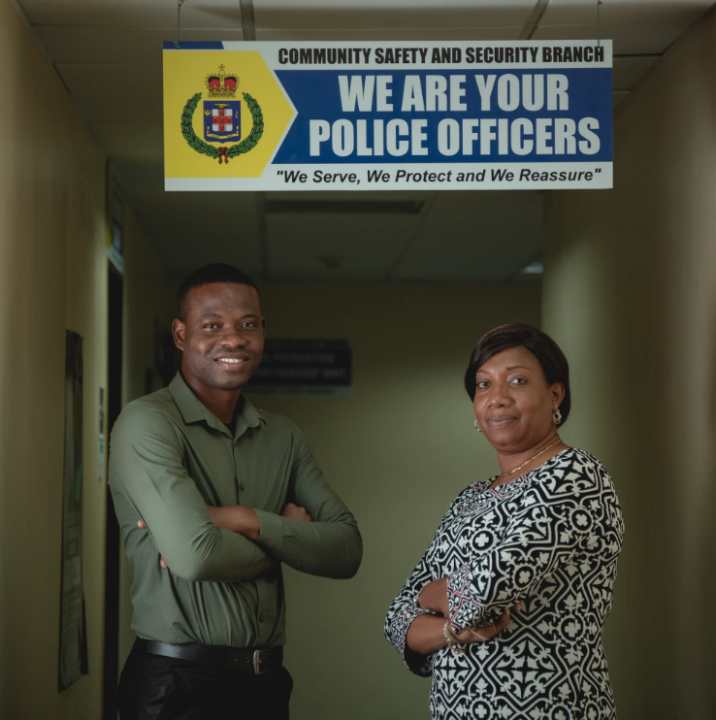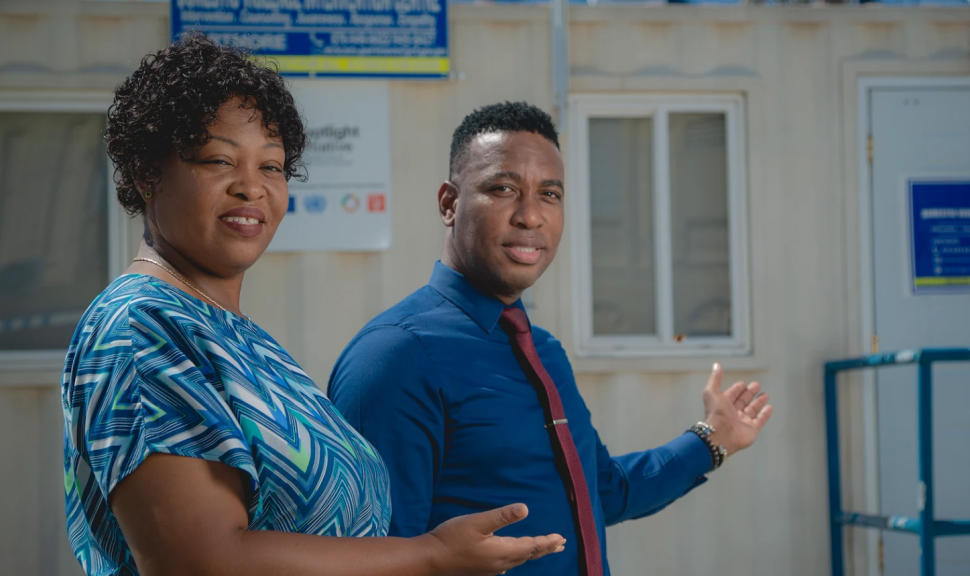A new generation of police officers supporting domestic violence survivors with care and compassion in Jamaica

PORTMORE, Jamaica - It’s long past normal work hours when Deputy Superintendent Jacqueline Dillion takes a distress call on a mobile phone assigned to the Domestic Violence Intervention Centres (DVICs) in Jamaica.
Often, a quick response and follow-up can mean the difference between safety or life-threatening injuries for a woman or girl experiencing violence.
Ms. Dillion leads the response team that operates a network of 10 DVICs. Each DVIC is run by a trained police officer offering counselling, referrals, law enforcement intervention, home visits and other services based on the survivor's needs. The centres are located on police premises but set apart from the general hub of the station.
Ms. Dillion and her team brand their compassionate, accessible service ‘DVICare’.
DVICare contact numbers are promoted on websites, brochures and at pop-up events to ensure quick and easy access to the officer network.
“Not everyone wants to just walk into a police station," says Ms. Dillion. "They want to go somewhere they can get the help and feel secure. So, when you put [access to] these centres at the fingertips of residents, it's all the better because the help is right there,” she explains.
Before mid-2021, the Jamaica Constabulary Force only had four such centres to serve all of Jamaica. The network expanded to 10 when six additional centres were established with the support of the United Nations Development Programme (UNDP) Multi Country Office in Jamaica under Spotlight Initiative. This expansion was combined with survivor-centred training delivered by the United Nations Population Fund (UNFPA).
"They have done tremendously well,” Ms. Dillion says of the new centres. "They are safe havens for many victims of domestic violence. The follow ups, the constant keeping in touch with victims, makes it easier for victims or survivors to want to talk to us," she reports.
Heavy caseloads
In the first 10 months of 2022, the number of domestic violence cases referred to the DVICs by police divisions were almost 16 per cent higher than the referrals for all of 2021.
Most people, however, contact the centre directly.
In 2022, DVICs recorded 1720 intimate partner violence cases and 924 family violence cases, with more than 650 reports made by children. While men are also using the centres to report, women and girls make up 75 per cent of the caseload.
In Jamaica, nearly one in three women have experienced gender-based violence while one in four report experiencing intimate partner violence in their lifetime, according to the National Prevalence Survey of 2018.
Part of the challenge is deeply rooted norms and attitudes, the study confirms. For example, two out of ten girls aged 15 to 19 believe it is okay for a husband or partner to hit his wife or partner, while 85 per cent of children experience violent discipline at home.
Few perpetrators face consequences, and female victims of violence more likely to turn to their personal networks than report to the police. Most women only seek police intervention when they are severely injured, the survey indicated.
The DVICs hope to change that.
"The centre provides confidentiality and comfort." - Detective Constable Damian Hammond
A safe haven
“People are understanding we have a domestic violence problem and that this is not a private issue,” observes Ms. Dillion. “Employers are getting more aware that there is help available. Many of them will tell you that they had no clue that the services were available.”
The expansion of the DVICare network has been a welcome initiative, says Detective Constable Damian Hammond, centre Manager for the Portmore DVIC, by far the island’s most patronized centre.
“Community members appreciate the centre because it provides confidentiality and comfort. They feel comfortable coming to us,” he says.
“We are about caring for and empathizing with people … it’s a safe haven. Once you are with us, you are protected and you can rest assured we will act on your behalf and in your best interest.”
Shortened from original story by Gillian Scott with technical support from Shellian Forrester. Originally published by UNDP Multi Country Office in Jamaica. Photos by Talk Up Yout for UNDP MCO in Jamaica.


